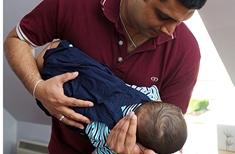Researchers define colicky baby as a healthy baby who is well-fed yet he continues crying for 3 hours or more in one day. This is usually for more than 3 days in a week and continues for more than 3 weeks.
The condition is not well-understood by experts, however, it is not a cause of alarm as children with colic grow up to be just as normal as children who don’t. The only problem is that dealing with an inconsolably crying baby can be a very frustrating situation for most parents.
How to treat a colicky baby
Even though colic can be very difficult to cope with, it is very common and won’t last forever and usually children over 3 months old do not have colic at all. Follow the steps below to stop your baby from crying:
1. Change, nurse and provide comfort
- First, change your baby
- Feed him with a bottle or nurse him
- Give him a pacifier and burp the baby
- Make the baby feel comfortable. Make sure the baby is not feeling too cold or too hot.
- If you are breastfeeding your baby, consider some dietary changes for yourself such as cutting down on caffeine, spicy food and citrus fruits
2. Change positions
- Place the baby in the infant recovery position—with the baby face down on your hand and the head resting on your forearm

Infant recovery position - Use a wearable carrier and place the baby in it
- Wrap the baby in his blanket
3. Move the baby
- Take the baby for a walk in the stroller or put him in his baby swing
- Placing your baby’s chair NEXT to a vibrating dryer or washer helps too
- Place your baby in his protective car seat and take him for a drive
4. Make calm noises
- You can sing to the baby in hushed tone
- Place a working vacuum or fan in the room
5. Keep calm
- If you are too tired, do not overwork yourself and take a short break. Ask your husband or any other family member to take care of the baby for you so that you have time to relax
- If another family member is not available, put your baby in his crib or any place where he is safe and go to another room where you can relax your mind for a few minutes
6. See your doctor if:
- If the baby shows other symptoms while he is crying such as vomiting, diarrhea, fever or a rash
Learn More
To learn more about providing excellent childcare and knowing what to do in case of a serious emergency enrol in first aid training with the workplace approved. Courses such as emergency and standard childcare first aid are excellent options for learning to provide care for children.
